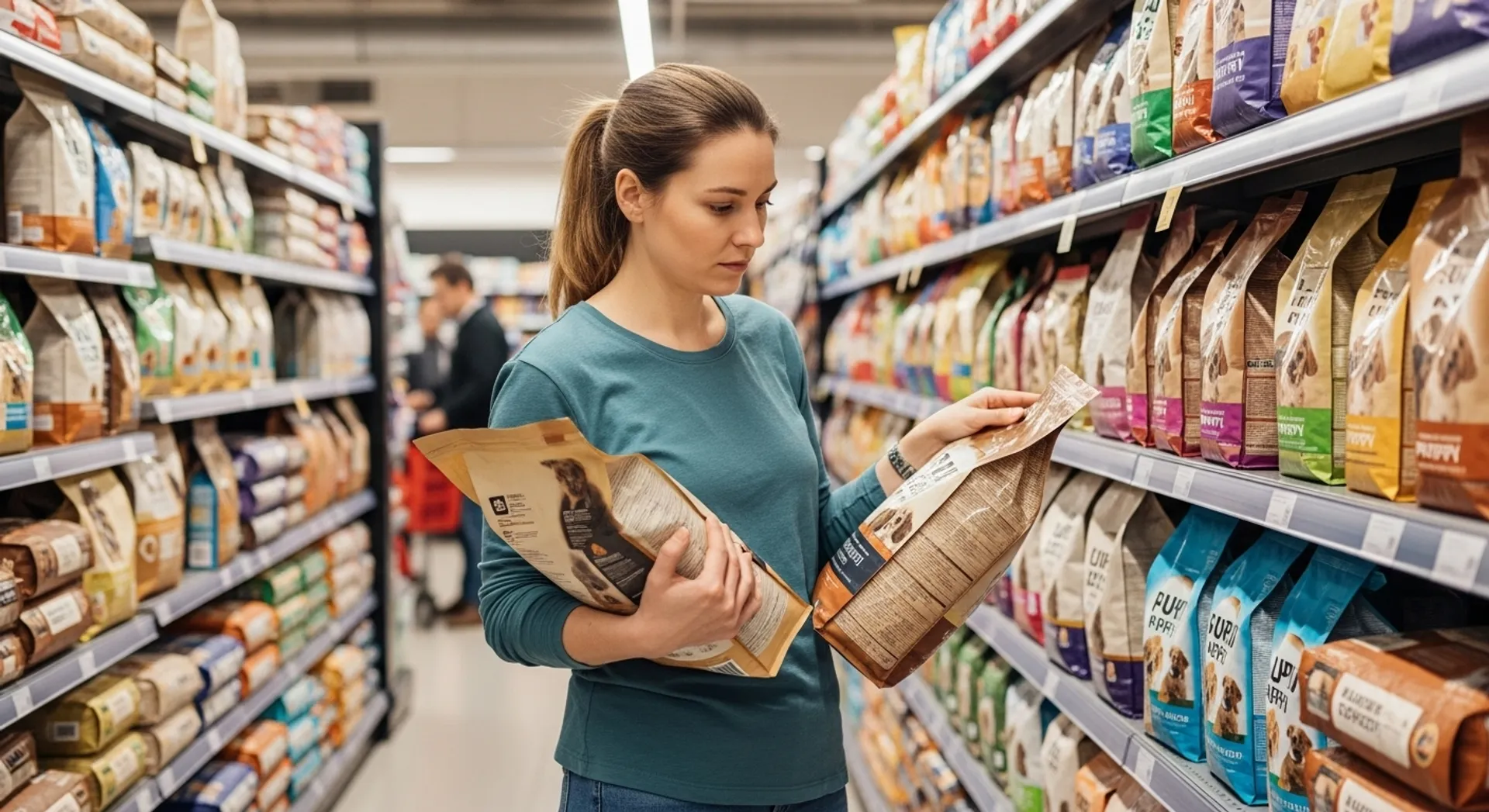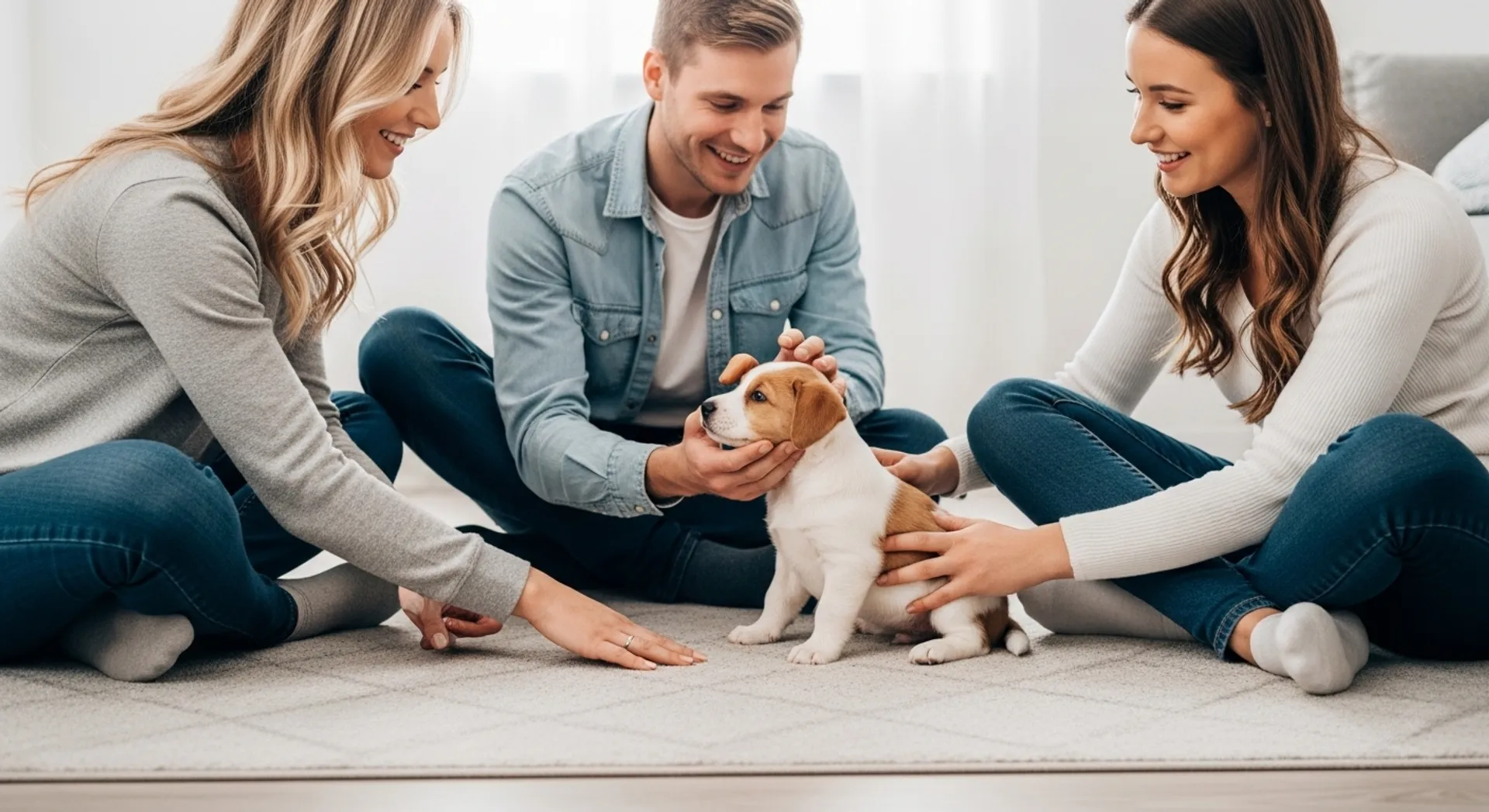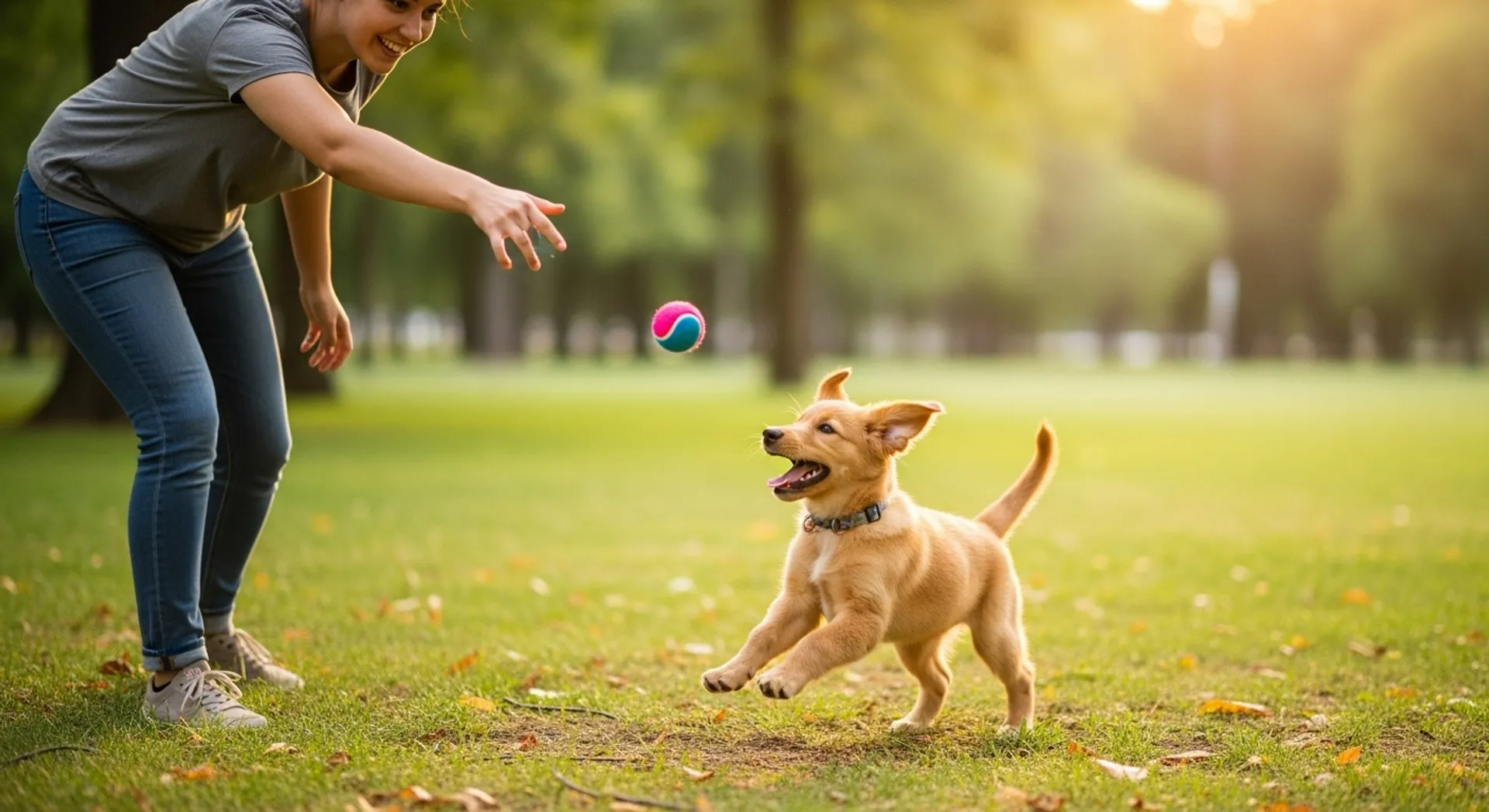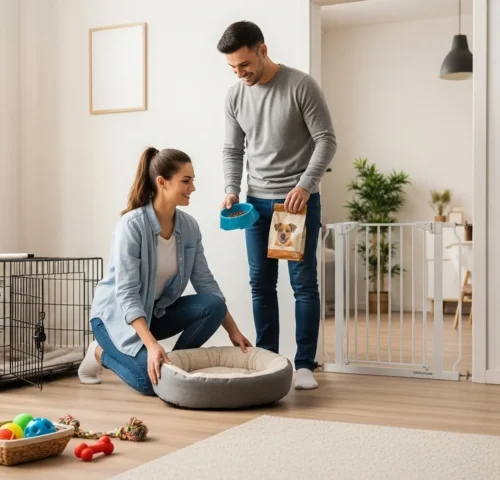Preparing Your Home for a Puppy
Before your pup even arrives, make sure your home is safe and ready for them. Puppies are curious by nature, and what looks harmless to you might be irresistible to them.
- Puppy-proofing: Remove small objects, toxic plants, exposed wires, and chemicals. Keep shoes and valuables stored away since puppies love to chew.
- Safe space: Set up a cozy area with a bed, crate, and toys where your puppy can retreat when tired or overstimulated.
- Supplies: Stock up on bowls, high-quality puppy food, a collar, leash, grooming items, and plenty of chew toys.
Think of it as baby-proofing, but with extra chew protection! The goal is to create a safe, inviting environment that encourages exploration without risk.
Feeding Your Puppy
Nutrition is one of the most important aspects of raising a puppy. Their bodies are growing rapidly, so they need the right balance of nutrients to support development.
Choosing the Right Food
Look for high-quality puppy food with real meat as the first ingredient. Puppies require more protein, fat, and calories than adult dogs. For example, large-breed puppies benefit from specially formulated food to support slower, steadier growth, which reduces the risk of joint issues later in life. For more details, check out our Dog Nutrition category.
Feeding Schedule
Puppies typically need three to four small meals a day. By 6 months, most can transition to two meals daily. Feeding on a schedule (rather than free-feeding) helps regulate digestion and supports housetraining.
Treats and Snacks
Use treats sparingly, especially during training. Healthy options include freeze-dried meats, small pieces of vegetables like carrots, or store-bought puppy treats. Avoid giving table scraps, which can upset their stomach or reinforce begging behavior.
Training Basics for Puppies
Training begins the moment your puppy comes home. The earlier you establish good habits, the easier it will be for your dog to grow into a well-mannered adult.
House Training
Take your puppy outside frequently — after meals, naps, and play sessions. Always reward them with praise or a treat when they go in the right spot. Expect accidents, but avoid punishment; instead, clean up with an enzymatic cleaner to remove odors.
Crate Training
A crate provides safety, helps with housetraining, and gives your pup a place of their own. Keep it inviting with soft bedding and toys, and introduce it gradually. Puppies should associate the crate with comfort, not punishment.
Basic Commands
Start with simple commands like sit, stay, come, and leave it. Keep sessions short — 5 to 10 minutes — so your puppy stays engaged. End on a success to keep training positive.
Socialization: Raising a Confident Dog
Proper socialization during the first few months is critical. Puppies exposed to different experiences grow into more confident and adaptable adults.
- Introduce your puppy to friendly, vaccinated dogs to encourage positive interactions.
- Expose them to household noises like vacuums, blenders, or doorbells so they learn not to fear everyday sounds.
- Invite visitors of different ages to gently interact with your pup.
- Take short car rides to help them adapt to travel.
Well-socialized puppies are less likely to develop behavioral problems like aggression or fearfulness later in life.
Health and Veterinary Care
Your puppy’s health depends on consistent veterinary care and preventive measures. Building a relationship with your vet early is one of the best steps you can take.
Vaccinations
Puppies need a series of vaccinations to protect against diseases such as parvo, distemper, and rabies. Follow your vet’s recommended schedule, and avoid taking your puppy to high-traffic pet areas until they’re fully vaccinated.
Deworming and Flea Control
Puppies are prone to worms and parasites. Regular deworming and flea prevention keep them comfortable and safe. Your vet can recommend the right products based on your location.
Spaying and Neutering
Discuss timing with your vet, as it may vary depending on your puppy’s breed and size. Spaying and neutering not only prevent unwanted litters but can also reduce risks of certain cancers and behavioral issues.
Exercise and Play
While puppies are bundles of energy, they tire quickly and need frequent rest. Playtime helps them burn energy, build coordination, and bond with you.
Safe Toys
Choose toys made specifically for puppies. Teething toys can ease gum discomfort, while interactive toys keep their minds engaged. Rotate toys every few days to keep things fresh and exciting.
Appropriate Exercise
Puppies should avoid long runs or strenuous exercise that could harm developing joints. Short walks, gentle play sessions, and games like fetch are ideal. Watch for signs of tiredness, like sitting or lying down mid-play, and allow breaks.
Grooming Your Puppy
Introducing grooming early helps your puppy become comfortable with being handled and prevents stress later in life.
- Brushing: Brush a few times a week, depending on coat type. Long-haired breeds need more frequent care.
- Bathing: Use puppy-safe shampoo. Bathing once a month is usually sufficient unless your pup gets especially dirty.
- Nail Trimming: Trim nails every 3–4 weeks. Handle paws daily so your puppy gets used to the sensation.
- Dental Care: Start brushing teeth early with dog-safe toothpaste. Chew toys and dental treats also help maintain oral hygiene.
Common Puppy Challenges
Puppies are adorable, but they also test your patience. Here are some common challenges and how to handle them:
Biting and Nipping
Puppies naturally use their mouths to explore. Redirect biting to chew toys and avoid rough play that encourages nipping. If they bite too hard, let out a yelp to mimic how littermates communicate boundaries.
Chewing
Chewing helps puppies relieve teething discomfort. Provide safe chew toys and puppy-proof your home by keeping cords, shoes, and valuables out of reach.
Separation Anxiety
Start leaving your puppy alone for short periods and gradually increase the time. Provide comfort items like a blanket or toy that smells like you. Crates can also help create a secure environment.
Traveling With Your Puppy
Getting your puppy used to car rides early makes future travel easier. Start with short, positive trips, like a ride to a park. Use a secure carrier or harness, and never let your puppy ride unsecured in the car.
Building a Routine
Puppies thrive on structure. Create a daily routine that includes feeding, potty breaks, play, training, and rest. A consistent schedule helps reduce anxiety and builds trust.
Example daily routine:
- Morning: Potty break, breakfast, short walk or play
- Midday: Training session and nap
- Afternoon: Potty break, play, and socialization
- Evening: Dinner, walk, and bonding time
- Night: Last potty break and bedtime in their crate or bed
Final Thoughts
Raising a puppy takes time, patience, and lots of love. With the right puppy care guide, you’ll be prepared to meet their needs and enjoy the journey together. By focusing on nutrition, training, socialization, health, and emotional support, you’ll help your pup grow into a happy, confident adult dog. For more guides like this, explore our Puppy Guide category here on The Dog Blog.




